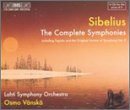| All Artists: Jean Sibelius, Osmo Vänskä, Lahti Symphony Orchestra Title: Sibelius: The Complete Symphonies Members Wishing: 0 Total Copies: 0 Label: Bis Release Date: 9/25/2001 Album Type: Box set, Import Genre: Classical Styles: Forms & Genres, Theatrical, Incidental & Program Music, Historical Periods, Modern, 20th, & 21st Century, Symphonies Number of Discs: 4 SwapaCD Credits: 4 UPC: 675754431525 |
Search - Jean Sibelius, Osmo Vänskä, Lahti Symphony Orchestra :: Sibelius: The Complete Symphonies
 | Jean Sibelius, Osmo Vänskä, Lahti Symphony Orchestra Sibelius: The Complete Symphonies Genre: Classical
|
Larger Image |
CD Details |
CD ReviewsGreat performances Nuddyguy | Collegedale, TN USA | 01/23/2003 (5 out of 5 stars) "I own three sets of the Sibelius symphonies: Maazel/VPO, Davis/LSO, and this one. There are still a lot of other ones out there that I haven't heard yet, but if were to make a recommendation this one would be my pick. Vanska and the Lahti Symphony Orchestra give some really fine performances of these works. A few bonuses with this Sibelius cycle is the symphonic poem Tapiola, and the 1915 version of the 5th symphony which is very interesting to compare with the final version. The sound quality is great, and the rather extensive liner notes give some very helpful information about each piece. This set costs a little bit more than some of the other ones available out there, but I think it's worth it. To be truly honest, my only disappointment with this set was the the 2nd symphony, which seemed to lack some of the intensity that I find in all the other performances in this collection. It's probably because the 2nd is my favorite Sibelius symphony and I'm really picky about it (I own 6 recordings of the 2nd). All I can say is don't let that keep you from buying this set. There are plenty of good recordings of the 2nd out there, so don't be discouraged. Still, I highly recommend this set. Just listen to some Sibelius. More people need to hear his music." Rock-solid performances in superior BIS sound Ed Brickell | 06/16/2003 (4 out of 5 stars) "Perhaps I've heard more memorable performances of some of these symphonies -- which, along with Debussy and Ravel's orchestral music, are my all-time favorite symphonic works -- but taken as a whole these are quite well played, with tempi reasonably judged and plenty of Sibelian atmosphere. The strings are a tad thin but have an appealing and appropriate "chill" to their sound, and the woodwinds and brass parts are persuasively characterized. As a bonus, you get BIS' wonderfully natural recorded sound, superior examples of how to properly record a symphony orchestra. If you're looking for one-stop Sibelius symphony shopping, you will be pleased with this collection." Something Inherently Right About This Complete Symphonies Se Grady Harp | Los Angeles, CA United States | 11/03/2006 (5 out of 5 stars) "Jean Sibelius remains somewhat of an enigma to concertgoers: nearly everyone is enraptured with the second symphony and many swoon over the fifth and seventh symphonies, but so often symphonies one, three, four, and six are overlooked. Yes, his violin concerto is well represented in nearly every contemporary violinist's repertoire, but the tone poems evade popularity. That is why it is exciting to own this fine set of four discs that not only surveys all seven symphonies but also adds the Tapiola as an encore.
Osmo Vänskä conducts the Lahti Symphony Orchestra in an echt recording of Sibelius. Yes, some may prefer a different approach to the more familiar symphonies such as the second, but taken as a whole Vänskä coaxes stunning performances from his ensemble. He allows the massive 'organ pedal' sustaining notes that occur repeatedly in all of the symphonies to sound as if they are the earth itself emerging through splits in the glacial craters of the Scandinavian landscape. His tempi are so correct that they constantly encourage the sense of urgency few other conductors find in the works. If this listener had to select a favorite among the works it would clearly be the performance of the rarely heard and somewhat musically retrospective Symphony No. 3. Rarely has this work seemed so coherent and so ripe with all the ideas that constantly sprang from Sibelius' mind. It is a gem of a performance. Not one for boxed sets usually, this particular one, recorded with some of the finest sound available, is a mighty exception. It is a solid, consistently inspiring reading of the Sibelius symphonies. Grady Harp, November 06 " |

 Track Listings (8) - Disc #1
Track Listings (8) - Disc #1